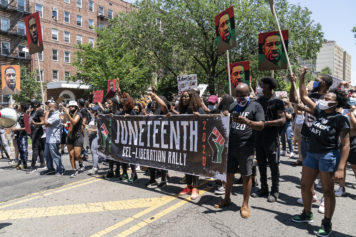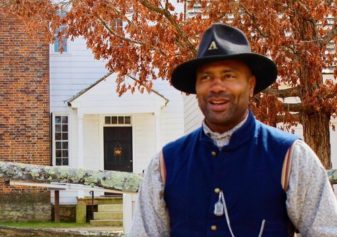
The Kuungana Drum and Dance Company, a Flint, Michigan-based dance company that celebrates West African dances, performs at a past Juneteenth celebration, which traditionally marks the end of slavery on June 19 in the United States. Photo/Associated Press
On June 19, Juneteenth is traditionally observed to commemorate the end of slavery in the United States. In many Black communities across the nation, parades, picnics and proclamations highlight jubilant festivities aimed at fostering learning and pride of African-American history.
But what exactly is Juneteenth and is it officially a holiday?
Many historians point to June 19, 1865, as the origin of Juneteenth. Following the end of the Civil War, Major Gen. Gordon Granger arrived in Galveston, Texas, which at the time represented the western frontier of the country, with nearly 2,000 Union troops and informed the area that President Abraham Lincoln had emancipated enslaved Africans two years earlier on Jan. 1, 1863.
He did so by publicly reading General Order No. 3, which proclaimed that all enslaved Africans, including the 250,000 that resided in Texas, were free.
“Shocked, disoriented, most likely fearful of an uncertain future in which they could do as they pleased, the liberated slaves of Texas celebrated,” wrote historian and author Kenneth C. Davis in a Smithsonian Magazine article. “Their moment of jubilee was spontaneous and ecstatic and began a tradition of marking freedom on Juneteenth.”
My piece #Juneteenth: Our Other Independence Day” (2011) via @SmithsonianMag #sschat #hsgovchat #slavery #CivilWar https://t.co/5RR5UBtMFK
— Kenneth C. Davis (@kennethcdavis) June 19, 2017
Not everyone, however, agrees with that traditional origin story of Juneteenth. Addae Moon, director of the Museum Theater at the Atlanta History Center, recently told radio station WABE in Atlanta that research suggests enslaved Africans in Texas had learned of emancipation prior to June 19, 1865.
“A lot of it is just more contemporary scholarship that we have as it relates to Juneteenth and also looking at the oral histories of enslaved people in Texas, in which they talk about finding out about emancipation and the fact that some people actually left prior to June 19,” Moon said.
“So, that gave us the idea that, well, maybe this lingering myth about Juneteenth being their discovery isn’t exactly accurate.”
Moon also said there is uncertainty about whether Juneteenth — a combination of “June” and “nineteenth” — should be celebrated on June 18 or June 19, as Granger and his troops arrived in Galveston Bay over those two days.
Nonetheless, June 19 has been widely accepted as the date to celebrate the event. Interest in the holiday waned for a time but was renewed by the Civil Rights movement of the 1950s and 1960s, according to historians.
In 1979, Texas became the first state to pass legislation making Juneteenth an official holiday. At least 44 other states and the District of Columbia have since recognized Juneteenth as either a state holiday or holiday observance, according to nationaljuneteenth.com.
As historian Henry Louis Gates has written about the holiday, the former enslaved Africans in Texas and their descendants viewed the occasion as more than a time to eat, drink and be merry.
This #Juneteenth, we celebrate emancipation and remember those who have fought for freedom. We must continue their work.
— Kamala Harris (@KamalaHarris) June 19, 2017
“For them, Juneteenth was, from its earliest incarnations, as Hayes Turner and others have recorded, a past that was ‘usable’ as an occasion for gathering lost family members, measuring progress against freedom and inculcating rising generations with the values of self-improvement and racial uplift,” Gates wrote.
“This was accomplished through readings of the Emancipation Proclamation, religious sermons and spirituals, the preservation of slave food delicacies (always at the center: the almighty barbecue pit), as well as the incorporation of new games and traditions, from baseball to rodeos and, later, stock car races and overhead flights.”
Today, traditions focusing around food have come to symbolize Juneteenth in many communities. At picnics, barbecues and church social gatherings, one may find red foods like red rice, red velvet cake and strawberry soda on the menu to signify, according to some, the blood that was spilled during slavery.
Celebrating #Juneteenth in our Sweet Home Cafe, with the culinary traditions of African Americans in Texas: https://t.co/WmjA3M7Xgq #FoodMW pic.twitter.com/BDCrNPOcJw
— Smithsonian’s NMAAHC (@NMAAHC) June 19, 2017
“Juneteenth today,” Wanda Blake, an Oakland, Calif., resident who handles finances for small culinary businesses, told The New York Times, “is a collective thank you to a people who made a way out of no way.”


